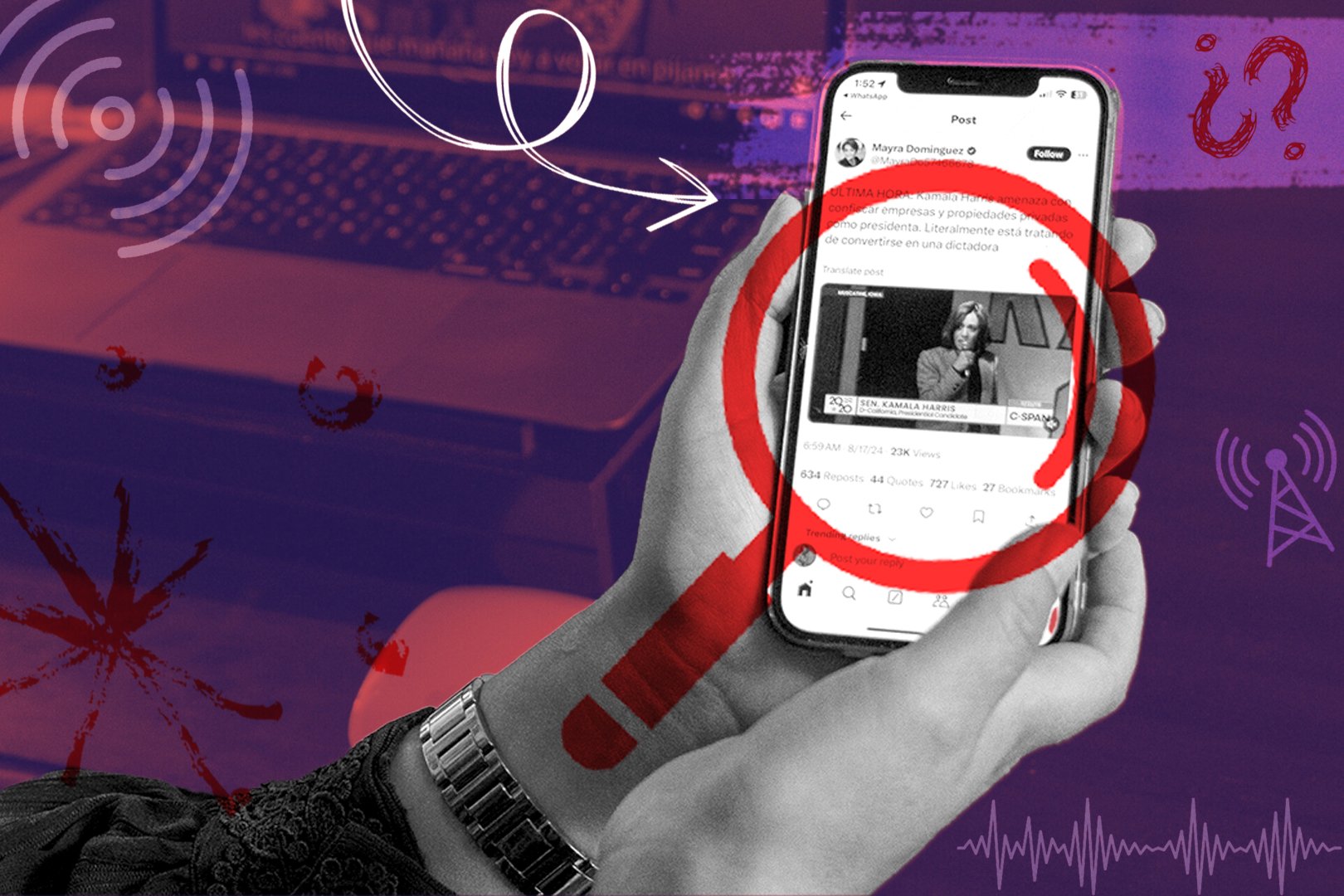In Battleground Wisconsin, Latinos Feel Ignored by Both Political Parties
Jorge Perez Serret, general manager of the Milwaukee market of Bustos Media, at the “La Grande 104.7” radio station in Milwaukee, Wisconsin. Photo by Caleb Alvarado for palabra
Latino voters in Wisconsin face a surge of immigration-related disinformation on social media and television. Meanwhile, Spanish-language radio is underutilized to reach this same group of voters.
Editor’s note: This story is part of Frequency of Deception / Radiofrecuencia de engaños, a six-part series by Feet in 2 Worlds in partnership with WNYC’s Notes from America, palabra, and Puente News Collaborative on the spread of dis- and misinformation on Spanish radio in the U.S.
Haz clic aquí para leer este reportaje en español.
MILWAUKEE, Wisconsin – Stark political ads blare incessantly on the airwaves of this crucial battleground state. They portray the southern border of the United States as out-of-control, chaotic terrain overrun by “waves” of immigrants without documents — a crisis in need of heavy-handed solutions.
The ads dominate mainstream television, radio, and streaming services. Even billboards and social media feature the messaging. Every platform is used — except the state’s largest Spanish-language radio network.
“The Republicans are doing very little in (Spanish) radio because they are not interested in Latinos,” said Jorge Perez Serret, 51, general manager of the Milwaukee market of Bustos Media, one of the largest independent Spanish radio networks in the country. “Democrats are doing the bare minimum to counter that message,” he added. “In my opinion, that’s political suicide.”
Wisconsin has a history of being a battleground state. In 2020 President Joe Biden won Wisconsin by a narrow 0.63% margin — fewer than 25,000 votes over former President Donald Trump. Everything suggests this year is no different; polls show an extremely close race between Trump and Vice President Kamala Harris in Wisconsin and other key swing states. Latinos could be the deciding factor that determines which way Wisconsin votes. Yet many Latinos here feel they are being ignored, not just by Republicans, but by Democrats as well.
Political signs at an intersection in Whitewater, Wisconsin. Photo by Caleb Alvarado for palabra
One way this neglect can be measured is by the scarcity of political advertising and candidate appearances on Spanish-language radio, a medium Latinos — not just in Wisconsin, but throughout the hemisphere — have traditionally valued as a primary source of information.
In the absence of political information on Spanish-language radio stations, a disinformation campaign about the border and other immigration issues aimed at the general population in Wisconsin is reaching Latino voters on social media and television. Factchequeado, a nonprofit, nonpartisan initiative that monitors and identifies misinformation and disinformation in Spanish, has been studying the media landscape in six of the top battleground states. Wisconsin is a peculiar case, said Factchequeado co-founder Laura Zommer.
“To our knowledge, in Wisconsin, most of the disinformation is happening through mainstream television, through WhatsApp, YouTube, TikTok or Facebook, but not much is happening through Spanish radio,” said Zommer. “One hypothesis is that today it’s generally cheaper to go outside radio.”
Zommer and others, including Armando Ibarra, a distinguished professor of Latinx and labor studies at the University of Wisconsin-Madison, cite several factors behind the snub of Spanish radio: changing media consumption habits, particularly among young Latinos, overall indifference from both political parties and shifting demographics. It’s estimated that about 43,000 younger, first-time Latino voters will be eligible to vote in Wisconsin this year.
Jorge Perez and his son, George Perez, sit at the “La Grande 104.7” radio station. Photo by Caleb Alvarado for palabra
Wisconsin’s rapidly growing Latino population stands at close to 450,000. But as of 2020 less than half — 181,000 — were citizens who are eligible to vote. In previous elections, the number of Latinos who voted lagged behind white and Black voter participation rates in the state. The lack of an effective Democratic counter-offensive in Wisconsin and other swing states, political observers said, may also help explain why the Trump campaign has managed to chip away at the large margins Democrats once enjoyed among Latino voters. In a state with such thin election margins, the smallest shift in voting can have a big impact on national politics.
Latino voters, explained Ibarra, are not “committed Democratic ideologues.” He added that many — particularly those growing up away from the urban centers of Milwaukee and Madison — hold more conservative views on issues like abortion and religious faith that align with the Republican Party.
“From an early age, young Latinos in rural areas grow up among staunch Republicans,” Ibarra said. “Their upbringing makes them ideal recruits for the Republican Party, though when it comes to policy, the Democrats still have a huge advantage.”
“(The Democratic Party) could be engaging more aggressively by breaking out … the campaign itself into areas such as Green Bay (a conservative region) with a Latinx focus,” Ibarra added. “There should have been people knocking on the doors. They should have people on the radio. They should have people where these folks are gathering, whether it's for recreation, a baile, or whatever, at the different festivals.”
Digital billboard ad paid for by the nonprofit organizations United We Dream and Voces de la Frontera Action on display on the southside of Milwaukee. Photo by Caleb Alvarado for palabra
Statue of César Chávez outside of El Rey grocery store, the largest neighborhood grocery store in South Milwaukee. Photo by Caleb Alvarado for palabra
Latinos are the second fastest-growing group of voting-age U.S. citizens in 2024, with about 36.2 million Latinos eligible to vote in November. One in five will be casting their first ballot in a presidential election. That highlights how the nation’s Latino population, over the last two decades, flipped from being primarily foreign-born to majority U.S.-born according to the Pew Research Center.
Still, there is a lack of information on Spanish-language radio — not just ads, but interviews with candidates and campaigns. That information gap makes Latino voters susceptible to a flood of questionable content from social media and right-wing influencers who rely on fear mongering about migrants and the border to instill panic among voters. Though the border is some 1,500 miles away, it’s become a local issue here, thanks to tens of millions of dollars being poured into mainstream media ads and the chatter of social media sites spouting debatable “alternative” facts and downright lies.
These messages, which often reflect former President Trump’s attacks on immigrants, don’t play well with some Latino voters. Miguel Aranda was a swing voter until Trump began referring to Mexican immigrants as “murderers” and “rapists.”
Born in California to Mexican immigrant parents, Aranda was raised in Whitewater, a university and farming community an hour’s drive southwest of Milwaukee. Migrants are a vital part of the economy in Wisconsin, he said, adding that the economic issues including workforce development and education are a higher priority for him than immigration.
Radio equipment at “La Grande 104.7.” Photo by Caleb Alvarado for palabra
In this year’s campaign, Trump’s language has become even more menacing toward immigrants, using disinformation and the threat to deport millions of people. That irritates and troubles Aranda, given his lived experiences and connection to Mexico.
“It is just tradition; people have always voted Republican,” said Aranda, who serves as vice president of the town’s school board and is now an activist with the local Democratic Party. “But (Trump’s) is just this fear-mongering message.”
With little information on the Spanish airwaves, some Latinos, including Juana Barajas, 52, a native of Guanajuato, Mexico, rely on social media and chat platforms like WhatsApp, Facebook and TikTok for information. Barajas owns the San Jose Mexican store, a small grocery store in Whitewater that specializes in Mexican and Latin American products. Like many in the community, Barajas said she is disturbed by images of migrants crowding the U.S.-Mexico border, which she sees on social media shared by family members back in Mexico.
She’s doubly disturbed by harshly critical reports coming from Mexico about the cost of migration to her homeland. In recent years, a growing number of asylum-seeking migrants have fled authoritarian regimes in Nicaragua and Venezuela, passing through Mexico and arriving in rural towns in Wisconsin and beyond. Barajas says she understands the motivation that drives migrants north. Still, she said she fears the demographic change is challenging for her and her white neighbors.
Juana Barajas at her grocery store in Whitewater, Wisconsin. Photo by Caleb Alvarado for palabra
“I have never lived with immigrants from a country other than Mexico,” Barajas said. “I tell the newcomers: learn English, ingratiate yourself in the community, because locals can turn on you in a second.”
In spite of her advice on assimilation — and even though she has been living in Wisconsin for more than 30 years — Barajas is not a U.S. citizen. Like many Latinos in this midwestern state, she can’t vote.
Barajas engages in politics in other ways. She prides herself on being a gatekeeper of “truthful information” for her family and customers. Recently, she received a viral video that claimed Florida Gov. Ron DeSantis would “pause” the state’s anti-immigration law to welcome migrants back to Florida to help with post-hurricane cleanup. Barajas passed the story to her customers, urging them, “not to even think about moving to Florida. Have dignity. *uck Florida, I screamed at them, for even thinking about moving.”
But the story was fake, according to Factchequeado.
“You don’t know what to believe anymore,” said Barajas after being presented with the Factchequeado findings, though she still believes the story may be true. “Because everyone’s talking about it … and not having information on the radio makes things worse.”
Mexican and Latino products available at Juana Barajas' store in Whitewater. Photo by Caleb Alvarado for palabra
One of the few radio ads targeting Spanish-speaking voters in Wisconsin contains false information. The ad from the campaign of Republican U.S. Senate candidate Eric Hovde claims that “illegal immigrants” are receiving checks from the federal government, and that the federal government is “financing a clinic in Madison (Wisconsin) where minors are receiving transgender therapy without the consent of their parents.”
We discovered this ad with the help of an algorithm developed by a Stanford University student to identify misinformation and disinformation on Spanish radio.
The ad, which began running recently, is airing on four Spanish radio stations, including at least one that Perez manages.
When asked about the ad, Perez said “clearly they are lies,” but added that he wasn’t “aware” of the entire content in the commercial.
Jorge Perez says he advocates for his Spanish-speaking listeners when misinformation is spread through political ads by local candidates. Photo by Caleb Alvarado for palabra
Perez said the candidates in Wisconsin’s U.S. Senate race and the presidential candidates have spent what amounts to “a drop in the bucket,” on advertising on his stations. Eric Hovde is challenging Democrat incumbent Senator Tammy Baldwin. The two candidates are running neck and neck in the polls.
According to Perez, Hovde bought 71 Spanish radio ads between early October through Election Day. Baldwin is doing “six times that,” he said, adding that the presidential campaigns “have done next to nothing … we [Latinos are] like an afterthought. The candidates should have been advertising all along.”
Perez recognizes that media consumption habits are changing, especially among younger Latinos. He sees it in his own family. His son, Jorge Jr., known as George, 21, is the presumed successor to the family radio business. These days, George, who is double majoring in finance and accounting at the University of Wisconsin-Parkside, questions the medium he once worshiped. He explains that it’s more “likely than not that people would rather surf other applications rather than the traditional radio.”
“I need to look at all my options,” George explained, pointing to fast-shifting media consumption trends.
Jorge Perez and his son, George Perez, at “La Grande 104.7” radio station. Photo by Caleb Alvarado for palabra
The elder Perez added it’s immigrant heads of family like him who can influence younger family members, particularly those leaning Republican because of so-called “shared values” on business and religion. George was going to vote for Trump until father and son sat down for a talk. Jorge reminded George to think critically, look at the border as part of his heritage, and understand that if Trump won the presidency, people he knows could face deportation.
“When I noticed that the demographics that (Republicans) appeal to don’t necessarily believe that I exist in the same space, I realized I didn’t belong,” said George, who is now planning to vote for Harris, just like his white girlfriend, Grace. “I would not want to align with a party that doesn’t necessarily believe me to be a citizen of the United States.”
Allowing social media influencers to target young Latinos like him, added George, “has a negative, distorted impact. We don’t have a full set of facts.”
George Perez shows his girlfriend Grace examples of misinformation on social media aimed at the Latino community. Photo by Caleb Alvarado for palabra
Nonetheless, Republicans smell blood, Perez and others said. After losing the state narrowly four years ago, the Wisconsin Republican Party vowed it would invest more resources in the Milwaukee Latino community — and the state as a whole — in hopes of at least narrowing the partisan gap.
The party named a young Latino, Hilario Deleon, as its chair in Milwaukee. As the Republican National Convention got underway in July, Deleon was seen everywhere, sitting with social media influencers and mainstream TV hosts, denouncing border security, immigration, and the economy, and posing with Trump for pictures. Deleon walked the city’s southside, canvassing for new voters. Alongside the state Republican chairman, he announced plans to open a new outreach center on the city’s Latino-heavy south side. But by mid-August, the new center sat empty.
“We’ve invited him several times to be interviewed for our Spanish radio audience and to speak to the Latino community, but he’s never taken our calls,” said Perez. “It’s like we are invisible to (the Republicans). Their indifference is perplexing. But they’re apparently fighting to get our vote.”
Calls placed to Deleon and the state Republican Party were not returned.
“La Grande 104.7” studio facilities in Milwaukee. Photo by Caleb Alvarado for palabra
The overall GOP strategy in metropolitan areas like Milwaukee and Madison — which vote heavily Democratic — isn’t necessarily about winning the Latino vote, but “winning by losing less,” said Sara L. McKinnon, professor of Rhetoric, Politics & Culture in the Department of Communication Arts, at the University of Wisconsin-Madison. McKinnon, who is the Faculty Director of Latin American, Caribbean & Iberian Studies at the university, adds that this means, “spending less [on Spanish radio advertising], and focusing more on platforms like TikTok or YouTube.”
Support the voices of independent journalists.Until Dec. 31, your donations will be matched dollar-for-dollar. 
|
In a close election no vote should be taken for granted by either party, argues Christine Neumann-Ortiz, executive director of Voces de la Frontera Action, a community outreach nonprofit registering new voters and increasing election participation throughout the state. Ibarra and Neumann-Ortiz say younger, first-time voters will be critical in this year’s election.
“They're trying to convince a very small number — you know, 8% of undecided voters in Georgia, 6% in Wisconsin — of people who have claimed to be undecided voters and who, unfortunately, many are younger people who neither party has reached,” said Ibarra, the University of Wisconsin-Madison professor. “Some of these young voters are thinking of voting for Trump, even though their parents may be immigrants without documents. Think about that; there’s a real disconnect, a cognitive dissonance between this generation and (the) second generation that’s fueled by disinformation.”
Milwaukee viewed from the Holton Street bridge swing park. Photo by Caleb Alvarado for palabra
That leaves groups like Voces de la Frontera Action to face the daunting task of engaging voters and making sure they have the right information, explained Neumann-Ortiz. They do this by canvassing door-to-door.
“Radio is a top priority for us,” said Neumann-Ortiz. “I feel like funding work… by trusted organizations that are critical to debunking lies came late and has been somewhat inadequate and that's a damn shame.”
—
Puente News collaborator Dudley Althaus contributed to this report.
This series is based on original reporting by investigative reporter Martina Guzmán. Logo design by Daniel Robles.
Feet in 2 Worlds is supported by the John D. and Catherine T. MacArthur Foundation, The Ford Foundation, the Fernandez Pave the Way Foundation, an anonymous donor, and contributors to our annual NewsMatch campaign. The Fund for Investigative Journalism provided funding for this project.
The radio programs referenced in our reporting were archived, preserved, and made available by the Internet Archive. Data journalist Jordan Rynning developed software to identify misinformation in those programs.
Alfredo Corchado is the executive editor for Puente News Collaborative and the former Mexico/Border Correspondent for The Dallas Morning News. He’s the author of “Midnight in Mexico” and “Homelands.” Puente News Collaborative is a bilingual nonprofit newsroom, convener and funder dedicated to high-quality, fact-based news from the U.S.-Mexico border. @ajcorchado
Caleb Santiago Alvarado is a first-generation Mexican-American photographer and director, born and raised amongst the dust of the Sonoran Desert in South Phoenix, Arizona. He graduated from Arizona State University with a Master’s degree in Architecture but fell in love with storytelling. It has since allowed Caleb to create personal, editorial, and commercial photography work that uplifts and captures the vibrant narratives of people, focusing on stories of color and personal vibrancy. @calebalvarado
John Rudolph is the founder of Feet in 2 Worlds, a leader in centering immigrant voices in journalism. Created in 2004, Feet in 2 Worlds (Fi2W) is an independent media outlet, journalism training program, and launchpad for emerging immigrant journalists and media makers of color. Fi2W brings positive and meaningful change to America’s newsrooms and has a broader impact on how immigration is reported and the ethnic and racial composition of news organizations. Over nearly five decades in journalism John has covered events in the U.S. and around the globe with a special focus on immigrants and immigration, U.S. politics, and environmental issues including climate change, population growth, and industrial pollution. His work has been honored by numerous journalism awards.
Dudley Althaus has reported on Mexico, Latin America and beyond for more than three decades as a staff newspaper correspondent. Beginning his career at a small newspaper on the Texas-Mexico border, Althaus had an award-winning 22-year stint as Mexico City bureau chief of the Houston Chronicle. After a four-year run as a Mexico correspondent for The Wall Street Journal, Althaus covered immigration and border issues as a freelancer based in San Antonio for Hearst Newspapers. He has covered every Mexican presidential election since 1988, when Mexico's troubled transition to democracy began. @dqalthaus
Martina Guzmán is the director of the Race & Justice Reporting Initiative at the Damon J. Keith Center for Civil Rights at Wayne State University Law School in Detroit, Michigan. Her reporting covers immigrant communities and systemic inequality. She was named Best Statewide Individual Reporter by the Associated Press for her work at WDET, Detroit’s NPR affiliate. Her exploration into the rise and fall of global, post-industrial cities earned her Best Investigative Series from the Michigan Broadcasters Association and the Associated Press of Michigan. Martina was the Detroit correspondent for The Takeaway, a radio news program by Public Radio International and WNYC. She has received numerous grants and fellowships, including the MacArthur Foundation, the German Marshall Fund and a Ford Foundation, to investigate the impacts of water shut-offs on women of color in South Africa and Detroit. She is a graduate of the Journalism School at Columbia University in New York City and a 2023 John S. Knight Journalism Fellow at Stanford University.



























